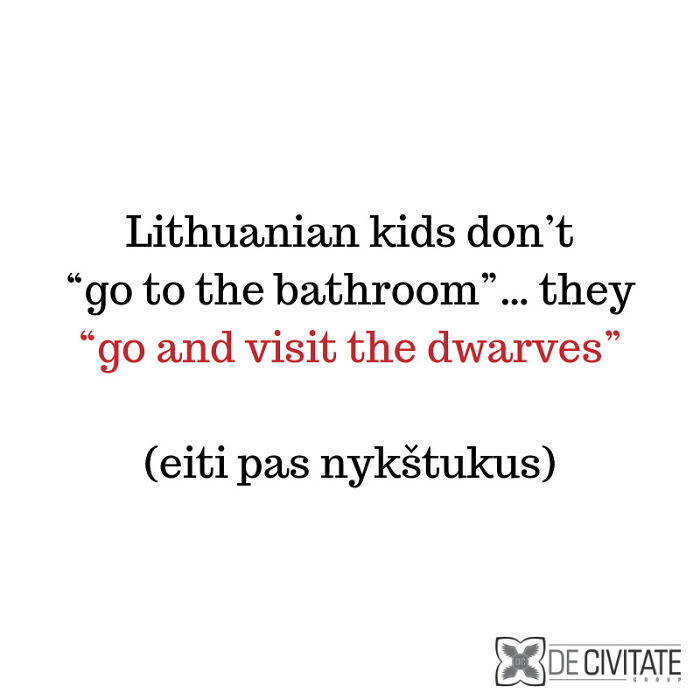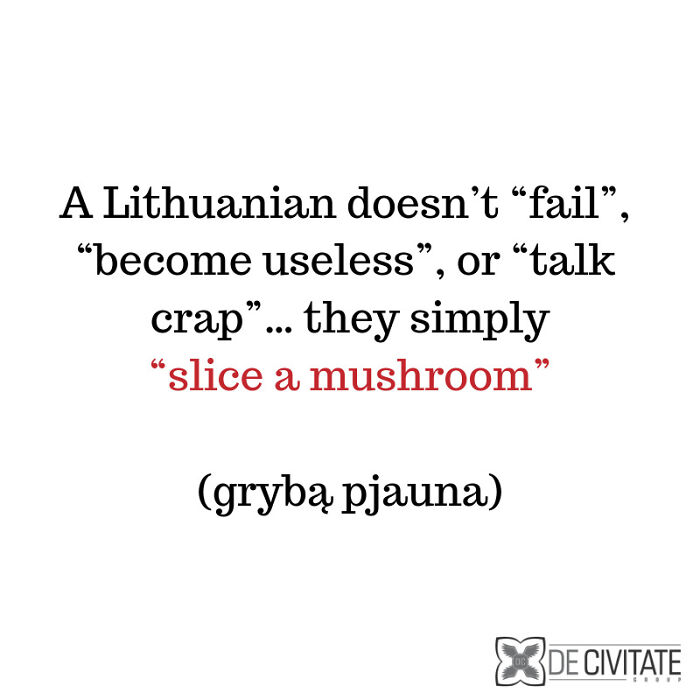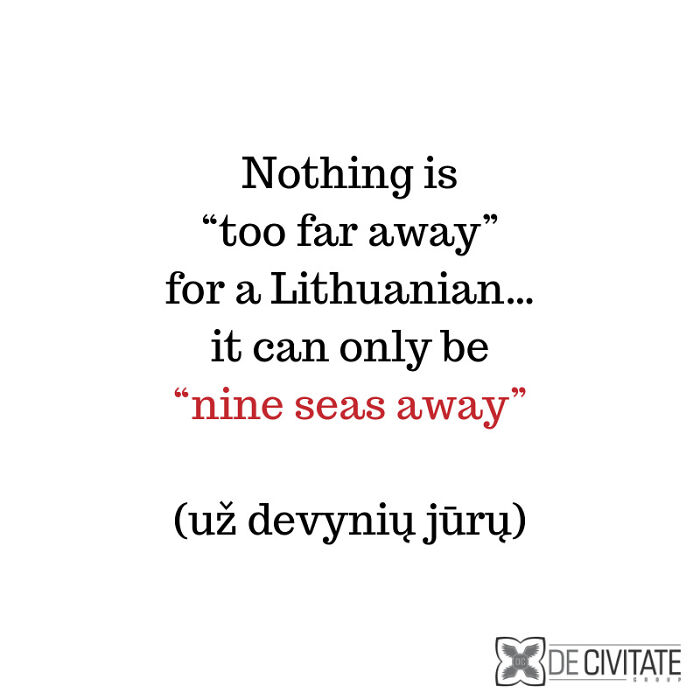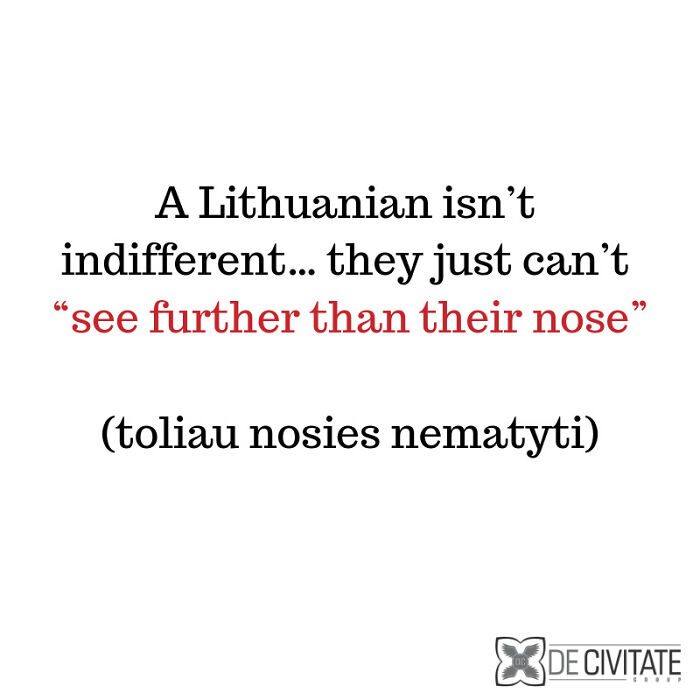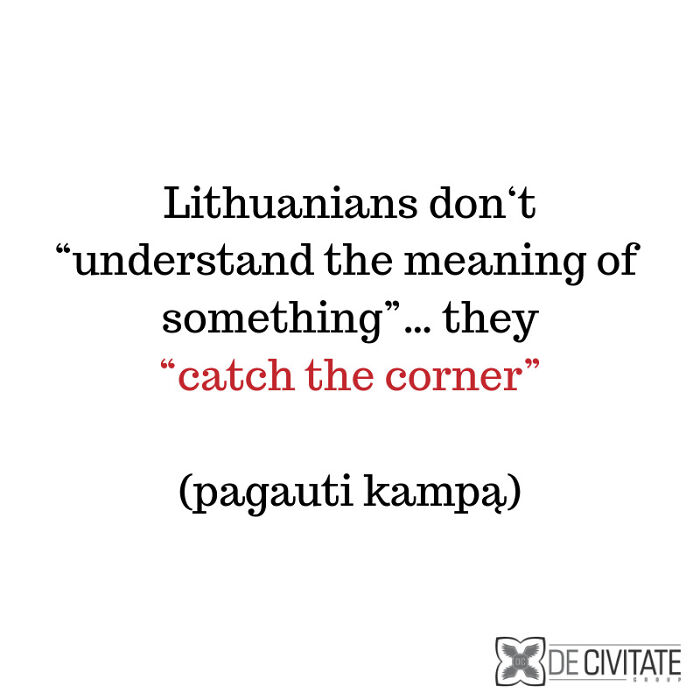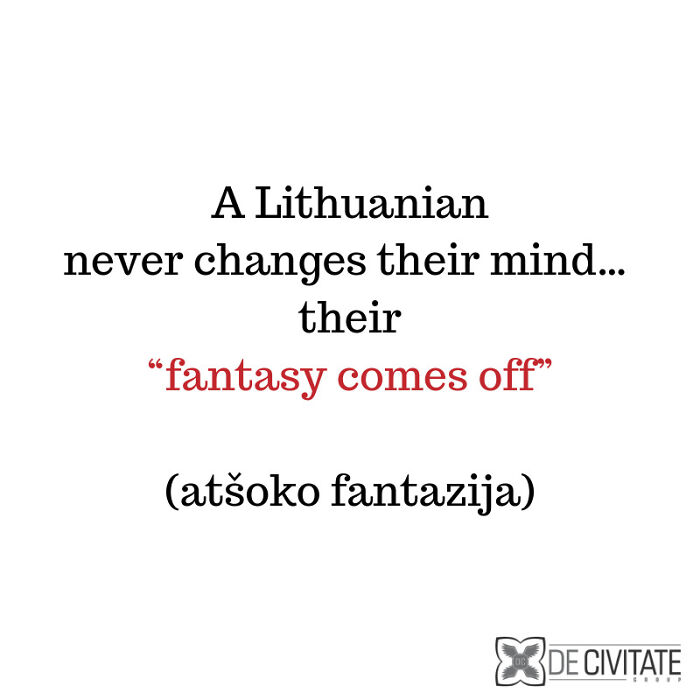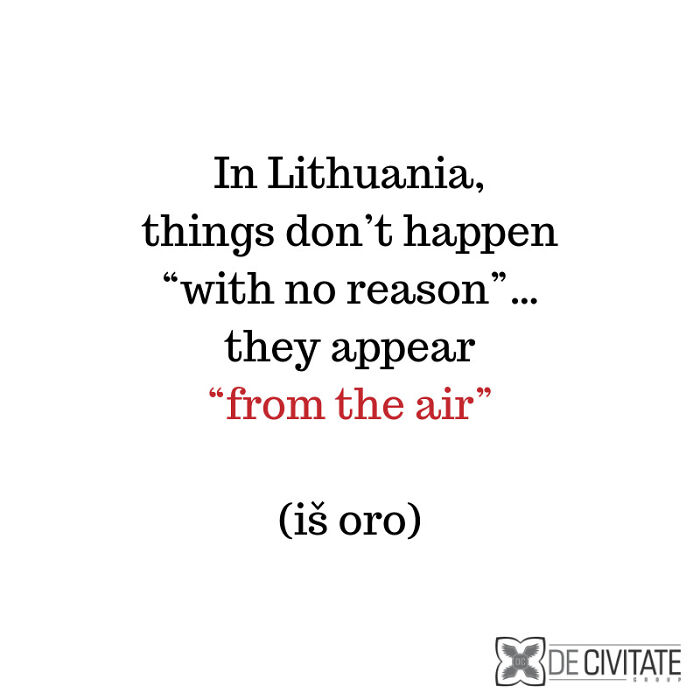Learning a new language is like going on an adventure: you might get lost in a magical maze, you might end up having to overcome challenge after challenge the size of giant angry dragons, but there’s always a chestful of rewards at the end. In this case, inside the treasure chest lies the satisfaction that you’ve mastered another gorgeous language—like Lithuanian.
The oldest Indo-European language that’s still being spoken today and a source of pride for Lithuanians the world over, Lithuanian is chock-full of fun little idioms, neat expressions, and metaphorical sayings that spice everything up with their Baltic charm. But here’s the thing: they sound incredibly weird when translated word for word and they’re bound to make you giggle.
Below, you’ll find some of the funniest Lithuanian expressions translated into English by the Matador Network. Upvote the ones that brought a smile to your face and we’d absolutely love to hear all about the most hilarious sayings in your native language if English isn’t your first, dear Pandas! Bored Panda reached out to a philologist from Lithuania to get to know idioms and expressions, as well as how they're usually translated between languages, a bit better. So be sure to read on for her full insights.
This post may include affiliate links.
That makes sense, because it is said that smart people worry more so they have more wrinkles.
This reminds me of my 10th grade English teacher. We couldn't have parties at my high school so he gave us "cumulative activities for positive reinforcement."
Very nice article As a travel blogger myself, The Solo Girl Traveler, I admire several travel bloggers for their amazing creativity, talent, and sense of adventure. https://www.triund-trek.com
In Finnish the word for fight is derived from the world kill. Good times
Make sense to me. It is used that way for example for the word twisted or crooked. in ancient Greek we can see that the word for perverted and crooked are the same, Scoliosis. So an old language like Lithuania having that as an expression is not a surprise.
I've never heard before the association of scoliosis with the meaning of perverted 🤔. It means that something's twisted, but like literally, not metaphorically. Nowadays, scoliosis is only a medical term in greek, meaning the deformation of spine.
Load More Replies...Hey, same in German, sort of "krumme Gedanken" is the same as "bad/dark/dirty ideas". Didn't realize it before!
in my language (cantonese), the slang for 'dirty minded' is pronounced as "ham sup", but the literal meaning is salty wet
The Lithuania-based language expert, who preferred to remain anonymous but whose identity is known to Bored Panda, explained that while it's difficult to say how any single saying came about, the odds are that somebody started using a specific turn of phrase and it enrooted itself in the language over time. "It's not enough to study just the language: you need to understand the culture, history, and folklore. It's impossible to find the sources of some of these idioms at all because they're ancient phrases," she said.
The expert pointed out that usually we never translate idioms word for word; we look for equivalents. For instance, the English version might be "put yourself in someone's shoes," but the Lithuanian equivalent is "įsijausk į kito kailį" ("take on someone else's fur"). The essence of sayings essentially the same; what differs is how they're expressed.
Not quite good translation. "Spoons after lunch" - would be more precise. And meaning - it's too late to change anything, since spoons after lunch are useless.
There is no "served" in the original Lithuanian expression. It's simply "spoons after lunch".
That is the point - it's ‘too late’, because spoon you need for the soup, not after it
Load More Replies...I bet it comes from old times when people had outside toilets. They were usually fashioned as small, colorful,
Load More Replies...Or for women in my country : squeezing your mussel out. In Flemish it's : uwe mossel uit knijpen.
Load More Replies...Oh f**k. When I was a kid I was _terrified_ _ of going to the bathroom at night because I thought little dwarves would come and grab me. I would run to the toilet and sit with my feet up so they couldn’t reach me. I am shocked about there being a saying that is similar to my imagination since I’m American and had never heard of this until today!
Also in italian there is "mangiare con gli occhi", which literally means "eat with your eyes", that is "look at something. or someone. with desire, love or greed"
In Bulgarian there is the same expression, too - "поглъщам с очи" or "поглъщам с поглед". But based on the context "поглъщам" means either swallow or absorb and in the example it is more appropriate to translate it as "absorb". Isn't that the case with the Lithuanian, too?
According to the philologist, we don't tend to notice how often we use idioms in our daily lives because they "make up a single unit of meaning" in our "mental lexicon" and aren't divided up into single words. In other words, we either use the entire idiom or we don't, there is no in-between. What's more, the reason why we don't track our use of idioms is the very same reason we don't think about how many times a day we use nouns or verbs: it's exhausting and unnecessary. We don't tend to think deeply about the things that we use to operate in our daily lives, as they're a part of us and hard to notice.
Though you'd think that a language is all the richer for having more idioms, the expert shared her opinion that this might not be the case. "From a linguistic perspective, all languages are equally rich. Of course, while you're translating texts, you might find some idioms particularly funny. Furthermore, they can sometimes have elements of folklore in them that can act as a gateway toward a deeper understanding of the culture."
Bored Panda was interested to find out which Lithuanian idioms the philologist personally found to be the funniest. In her opinion, "devintas vanduo nuo kisieliaus" ("the ninth water from the pap" aka a distant family relation) and "už nosies vedžioti" ("lead by the nose" aka lead someone on) are worth a special mention. However, as she says, "all idioms are interesting and funny if you can imagine them in your mind."
In Spanish they say 'Your cooking pot is leaving' (se te va la olla) :-D
when my roof drives away by itself .... we will have a serious problem!
What if you _actually_ want to slice a mushroom though? Mmmm... mushrooms, nom
It's "cut a mushroom" as in wonder in the forest looking for some mushrooms. (Slice is "pjausto" in LT, so a different meaning).
This one reminds me of a similar one in my mom's family: Are you too stupid to slice a mushroom? is the general gist of it in English.
Me as well, though I'm thinking it is such a soft thing and super easy to slice, like that is all you're good for...?
Load More Replies...In Polish it's "where the crayfish hibernate". For some reason...
Load More Replies...Sounds a lot harsher/ruder way of saying it. Lecture meaning teach, but as a phrase angrily. Where as where legs grow from, sounds like you're teaching in a belittling way, like how can you not understand this.
"I'll show you where your a** is" came from my mom's dad, and that's the nice version, LOL.
Idioms are artistic expressions that are peculiar and can’t be understood from the individual meanings of their elements. In short, they rely very heavily on metaphors, playfulness, and creativity to put across a point. Without knowing the language, culture, and context, you’d be lost… in translation (sorry, the joke was there—I had to make it).
While people have been speaking Lithuanian in one form or another for ages and ages, Lithuanian as a literary language has only existed since the start of the 16th century, with the translations of the Lord’s Prayer, the Ave Maria, and the Nicene creed being the earliest documents.
That's make sense, at the beginings beers were made out of bread so it was literally liquid bread.
Not quite accurate. Beer and bread share the same ingredients but the first beer was not made from bread. You can’t distill bread after baking.
Load More Replies..."Beeeeeer, is liquid bread it's good for you, we like to drink 'til we spew, Ew!. Who cares if we get fat? I'll drink to that! As we sing once more... Oh what is the malted-liquour, what gets you drunker quicker, what comes in bottles or in cans? (BEER)"
Also, "don't pull my leg" or "are you pulling my leg?" in reference to somebody lying.
Load More Replies...In my native tongue, if you're trying to fool someone, or lying to someone, you're euphemistically said to be tying eggplants to their ears. Sort of an equivalent to teaching someone to suck eggs.
"Pasta on the ears" is the same in Russian! I wonder where this comes from...
This in a south indian language means to make fool of someone by placing a flower in the ear
Beating around the bush! I like the imagery of wrapping words in cotton wool!
I've been referring to this softening language as "fluff" for a long time myself...
Load More Replies...You can wrap everything in cotton wool in German if you are very careful with it, so you may also be able to wrap words in cotto wool.
Isn't "sugar coating" quite similar? I think I heard it being used for making unpleasant truth more "sweet" and easier to process but I'm not an English native speaker so idk for sure
Lithuanians are generally a humble people and you might mistake them for Finns at first glance. That is, unless you mention basketball (their national team nearly thrashed the US at the 2000 Olympics!) or their language.
Any Lithuanian worth their salt will immediately start bragging, (subtly at first, more overtly once they warm up) about how their language is the oldest on Planet Earth. And while several different languages and dialects can make that claim, you can safely say that Lithuanian ranks among the most ancient ones still in use today. The similarities to Sanskrit are absolutely amazing if you’ve ever had the pleasure of looking through dictionaries from both languages.
One of the most influential French linguists, Antoine Meillet, stated that “anyone wishing to hear how Indo-Europeans spoke should come and listen to a Lithuanian peasant,” and Lithuanians have been quoting him pretty much every chance they get.
In Greece when somebody leaves the door open the others go "Were you born in a boat?"
This was unexpected... I love how different it is from all the others here!
Load More Replies...In Czech Republic we say. Do you have a n****r behind your ass. For real. And sorry, I don't wanna spread hate here, but it's just true
In Germany you may get asked if there are sacks hanging before your doors at home. (Habt ihr daheim Säck vor den Türen?)
Australia. "Were you born in a tent" is what my mum would say. Another thing I remember her saying if we were in front of the TV "you're a pain but not a pane of glass"
Sounds like me telling people I didn't do something, "I didn't ABANDON them, no, I just left them on the ice."
In Poland too. Zostawić kogoś na lodzie - leave somebody on the ice - abandon somebody in hopeless situation/ without any help.
Tak, tylko znaczenie chyba trochę inne, bo to bardziej 'strand' niż 'abandon'
Load More Replies...In Poland too - Zostawić kogoś na lodzie - leave somebody on the ice = abandon somebody in hopeless situation.
In Spanish we say "where Jesus Christ lost his sandal"
Load More Replies...In Spanish we say "where Christ lost a sandal," or " where the devil keeps his archives. ". 😄😄
In Romanian we have the classic, "la mama dracului" -"at the Devil's mother", " la dracul in praznic" - "where the Devil held his burial feast", "unde si-a intercat dracul copii" - "where the Devil raised his children", and, the best of all in my opinion, "In pula cu satelitul" - "go to the d**k by way of satellite"
At the devil's mother we say in Greece too! Or at the devil's horn!
Load More Replies...In Poland we have seven seas away - but it's an expression from fairytales.
In France we have the same trouble with our eyeballs but not out of surprise but anger.
In the US we say "Eyes popping out of their head" which is actually very similar
Same in Germany, too, though here it means "ignorant".
Load More Replies...In France too, but for us it means a lack of discernment, insight and the inability of planning/seeing long term.
This is German as well. Here it means, that you can't plan ahead or think about the big picture.
This is used in the US too, at least in certain parts, but that's probably a German influence as many of my family and surrounding area were settled by German immigrants.
For donkeys there is another: "nebūk asilas" - don't be fooled / sily
Load More Replies...This is such a great way of thinking. Should be adopted by everyone. People wouldn't have to stigma or stubbornness of "changing their minds" if it was seen as a progression of more information / more intelligence / understanding etc. Fantastic.
It reminds me of the Mexican saying "le salió el cobre" (the copper shows) like some jewelry painted golden and after a while the copper underneath starts showing... the English equivalent would be "showed his true colors"
like how Trump got elected.... and poof....he's gone again - back 'into the air'
In France we says "to apply make up with a trowel" or "she wear make up like a stolen car".
Sometimes in English they "put it on with a butter knife".
Load More Replies...I guess it's like, "Spit on your hands, and take hold of the shovel"? Meaning to get on with the job?
Wait, is this "fool around" like sexually, or like goofing off/horsing around?
I haven’t read all of these yet, but I can already say I would love this as a series, featuring various languages! :D
Given the proximity to Poland and a long history between those countries it's fascinating how different both languages are. I literally can read Russian and beside the alphabet, Russian and Polish do have a lot in common. But there are not many words here I can understand.
It is fascinating how two languages from totally different groups are different? Hmm... Next time, you will be shocked to know that polish and german are different. Dude, you better hide from Hungarians, or they will blow your mind XD
Load More Replies...Very amusing. In Romania, we also have a lot of funny expressions, mainly involving the rod "pula" (d**k) and a very talented comic artist illustrated some of them: https://utopiabalcanica.net/2019/12/05/20-ingenious-ways-to-use-pla-in-the-romanian-language/
I meant "word", not "rod", even though it ended up weirdly appropriate. Yaay for acutocorrect...
Load More Replies...Im suprised how much of these are the same in polish :) Language is tottally different but phrases just have exact same meaning.
I haven’t read all of these yet, but I can already say I would love this as a series, featuring various languages! :D
Given the proximity to Poland and a long history between those countries it's fascinating how different both languages are. I literally can read Russian and beside the alphabet, Russian and Polish do have a lot in common. But there are not many words here I can understand.
It is fascinating how two languages from totally different groups are different? Hmm... Next time, you will be shocked to know that polish and german are different. Dude, you better hide from Hungarians, or they will blow your mind XD
Load More Replies...Very amusing. In Romania, we also have a lot of funny expressions, mainly involving the rod "pula" (d**k) and a very talented comic artist illustrated some of them: https://utopiabalcanica.net/2019/12/05/20-ingenious-ways-to-use-pla-in-the-romanian-language/
I meant "word", not "rod", even though it ended up weirdly appropriate. Yaay for acutocorrect...
Load More Replies...Im suprised how much of these are the same in polish :) Language is tottally different but phrases just have exact same meaning.

 Dark Mode
Dark Mode 

 No fees, cancel anytime
No fees, cancel anytime 












